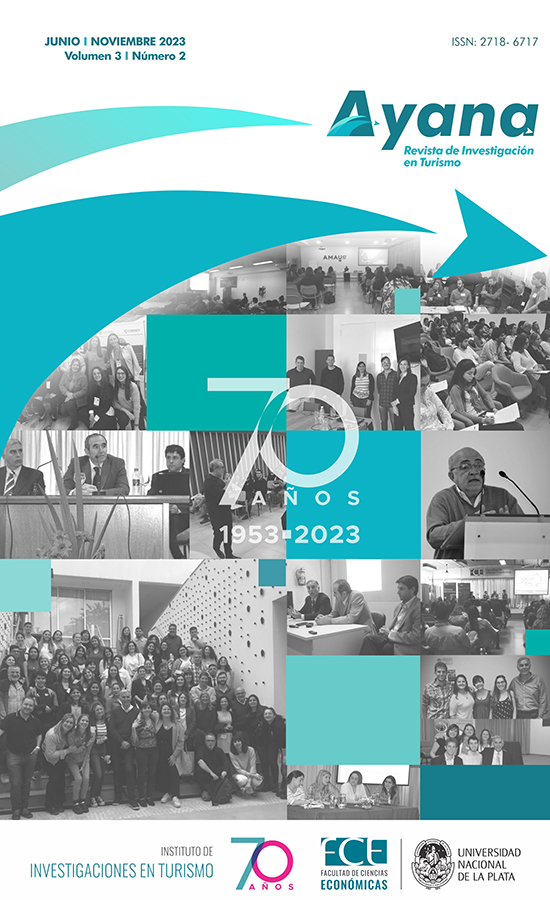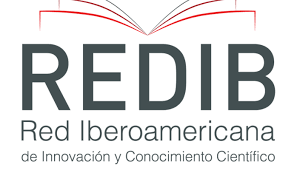Confidence of a conceptual model from the risk perceived by tourists to the contagion of COVID-19
DOI:
https://doi.org/10.24215/27186717e032Keywords:
Risk perception, tourists, COVID-19, beach tourismAbstract
COVID-19 has had a major impact on the global economy, mainly the tourism sector, due to the reduction in foreign visitors due to the measures imposed by governments to deal with the virus. Thus, the objective of this work is to measure the reliability of a conceptual model on the perception of risk on COVID-19 assumed by national tourists who frequent three beaches in Ecuador. The instrument applied based on the Likert appreciative scale of 3 points to 1137 local guests, allowed to assess, through a compararison, the tourist proposal. The results show, by statistical significance (p-value = 0.000 α = 0.05), the relationship between the risk, sociodemographic and psychosocial variables. Consequently, based on the conceptual assessment, the perception model is applicable to the evaluated local context and the improvement of the security plan in different destinations is recommended to improve the image and competitiveness of the country.
Downloads
References
Álvarez, C. A. y Avilés, C. A. (2018). Plan de acción para mejorar el uso turístico del Área Nacional de Recreación “Playas Villamil” [Tesis de título, Universidad Católica de Santiago de Guayaquil]. http://repositorio.ucsg.edu.ec/handle/3317/10241
An, M., Lee, C. y Noh, Y. (2010). Risk factors at the travel destination: Their impact on air travel satisfaction and repurchase intention. Service Business, 4(2), 155-166. https://doi.org/10.1007/s11628-010-0094-2
Artuğer, S. (2015). The effect of risk perceptions on tourists. Revisit intentions. European Journal of Business and Management, 7(2), 36-43.
Avecillas, I., Crespo, A., Torres, L. y Barzallo, C. (2021). El turista cultural extranjero de museos en la ciudad de Cuenca-Ecuador. Revista Chakiñan de Ciencias Sociales y Humanidades, (13), 72-84. https://doi.org/10.37135/chk.002.13.04
Benítez, B. I., Hernández, L. y Solís, M. M. (2019). Percepción del riesgo en la elección del destino turístico para vacacionar. Academia Journals, 11(9), 353-358.
Bloom Consulting. (2020). COVID-19. The Impact on Tourist Behaviours.
Botero, C., Mercade, S., Cabrera, J. y Bombana, B. (2020). O turismo de sol e praia no contexto da covid-19. Cenários e recomendações. https://www.geografia.ufrj.br/turismo-de-sol-e-praia-covid-19/
Carballo, R. R., Carballo, M. M., León, Carmelo. J. y Moreno, S. (2021). La percepción del riesgo y su implementación en la gestión y promoción de los destinos turísticos. El efecto moderador del destino. Cuadernos de Turismo, (47), 23-36. https://doi.org/10.6018/turismo.473991
Castellucci, D. I., Cruz, G. y Barbini, B. (2018). Comunidad residente y turismo: percepción de los impactos en un destino de sol y playa. El caso de Mar del Plata (Argentina). En A. Muñoz Barriga, M. Osorio y G. Guijarro (Eds.), Tendencias de investigación en turismo en América Latina. Estudios de caso (pp. 46-63). Pontificia Universidad Católica del Ecuador.
Ceberio, M. R., Cócola, F., Benedicto, G., Jones, G., Agostinelli, J. D. y Daverio, R. F. (2022). Evaluación del grado de percepción de riesgo al contagio del COVID-19. Revista Caribeña de Psicología, 6(1). https://doi.org/10.37226/rcp.v6i1.6051
Cedeño, G. M., López, C. R. y Merino, G. G. (2022). Revisión de procesos para la mitigación de residuos en el Yasuní por Actividad Turística. Polo de conocimiento, 7(1), 896-918. https://doi.org/10.23857/pc.v7i1.3517
Cori, L., Bianchi, F., Cadum, E. y Anthonj, C. (2020). Risk perception and COVID-19. International Journal of Environmental Research and Public Health, 17(9), 3114. https://doi.org/10.3390/ijerph17093114
Dryhurst, S., Schneider, C. R., Kerr, J., Freeman, A. L., Recchia, G., Van Der Bles, A. M., Spiegelhalter, D. y Van Der Linden, S. (2020). Risk perceptions of COVID-19 around the world. Journal of Risk Research, 23(7-8), 994-1006. https://doi.org/10.1080/13669877.2020.1758193
Félix, A., Montalván, P., Morales, M. y Párraga, Y. (2022). El turismo comunitario como apuesta de diversificación en destinos sol y playa. Caso de la comuna ancestral de Ligüiqui. Manta, Ecuador. ROTUR. Revista de Ocio y Turismo, 16(1), 100-118. https://doi.org/10.17979/rotur.2022.16.1.8603
Flaxman, S., Mishra, S., Gandy, A., Unwin, H. J. T., Mellan, T. A., Coupland, H., Whittaker, C., Zhu, H., Berah, T., Eaton, J. W., Monod, M., Imperial College COVID-19 Response Team, Ghani, A. C., Donnelly, C. A., Riley, S., Vollmer, M. A. C., Ferguson, N. M., Okell, L. C. y Bhatt, S. (2020). Estimating the effects of non-pharmaceutical interventions on COVID-19 in Europe. Nature, 584(7820), 257-261. https://doi.org/10.1038/s41586-020-2405-7
García, N. y Quintero, Y. (2018). Producto de sol y playa para el desarrollo turístico del Municipio Trinidad de Cuba. Revista Interamericana de Ambiente y Turismo, 14(1), 52-64. http://dx.doi.org/10.4067/S0718-235X2018000100052
García, A., Serrano, R, Osorio, M. y López, E. (2015). Percepción de la comunidad en torno al turismo como factor de desarrollo local. Caso San Pedro Tultepec. Turismo y Sociedad, 16, 43-65. http://dx.doi.org/10.18601/01207555.n16.04
Gil, M. A. (2017). Diseño de un plan de marketing para la agencia de viajes Aires y Destinos. https://ciencia.lasalle.edu.co/administracion_de_empresas/1
Gómez, M. B. (2017). Retos del turismo español ante el cambio climático. Investigaciones Geográficas, 67, 31-47. https://doi.org/10.14198/INGEO2017.67.02
Hsiang, S., Allen, D., Annan-Phan, S., Bell, K., Bolliger, I., Chong, T., Druckenmiller, H., Huang, L. Y., Hultgren, A., Krasovich, E., Lau, P., Lee, J., Rolf, E., Tseng, J. y Wu, T. (2020). The effect of large-scale anti-contagion policies on the COVID-19 pandemic. Nature, 584(7820), 262-267. https://doi.org/10.1038/s41586-020-2404-8
Instituto Nacional de Estadística y Censos. (2021). Censo de Población y Vivienda. https://www.ecuadorencifras.gob.ec/base-de-datos-censo-de-poblacion-y-vivienda/
Maldonado, C. P., del Río, M. de la C., Noboa, P. y Álvarez, J. (2020). Turismo comunitario en el Ecuador: emprendimientos comunitarios de las redes provinciales y cantonales. Sostenibilidad, 12 (15), 6256. http://dx.doi.org/10.3390/su12156256
Martínez, S. (2017). Uso y abuso del término percepción de riesgo. Revista Cubana de Salud Pública, 43(3), 1-7.
Matar, S., Ortiz, M. J. y González, J. (2021). Diseño y validación de un cuestionario para evaluar la percepción de riesgo de contagio de Covid-19 en la población colombiana. Revista Peruana de Medicina Experimental y Salud Pública, 38(4), 512-520. https://doi.org/10.17843/rpmesp.2021.384.9298
Mestanza, C., Chica, J. A., Anfuso, G., Mooser, A., Botero, C. M. y Pranzini, E. (2020). Tourism in Continental Ecuador and the Galapagos Islands: An Integrated Coastal Zone Management (ICZM) perspective. Water, 12 (6), 1647. http://dx.doi.org/10.3390/w12061647
Ministerio de Salud Pública de Ecuador. (2021, 23 de septiembre). Actualización de casos de coronavirus en Ecuador. [Web gubernamental]. https://www.salud.gob.ec/actualizacion-de-casos-de-coronavirus-en-ecuador/
Ministerio de Turismo de Ecuador. (2021). Comportamiento del turismo a nivel nacional dada la Nueva Normalidad generada por la Afectación del Virus COVID-19.
Ministerio de Turismo de Ecuador. (2021). Geoportal de visitas internas turísticas 2017-2018. https://servicios.turismo.gob.ec/index.php/turismo-cifras/
Novelli, M., Gussing, L., Jones, A. y Ritchie, B. (2018). ‘No Ebola…still doomed’. The Ebola-induced tourism crisis. Annals of Tourism Research, 70, 76-87. https://doi.org/10.1016/j.annals.2018.03.006
Peco, F., Polo, A. y Frías, D. M. (2021). El efecto del Covid-19 en la intención de los turistas de retomar el consumo hotelero: el papel de la resiliencia. Revista Internacional de Gestión Hotelera, 99, 103075. https://doi.org/10.1016/j.ijhm.2021.103075
Possebon, J., Cervi, C. y Knebel, D. (2019). Factores que influyen en la decisión de compra de viajes turísticos. Un estudio en el Noroeste de Rio Grande do Sul (Brasil). Estudios y Perspectivas en Turismo, 28(4), 903-922.
Ruiz, A. y Jiménez, M. (2020). SARS-CoV-2 y pandemia de síndrome respiratorio agudo (COVID-19). Ars Pharmaceutica, 61(2), 63-79.
Sánchez, J. R. P., Montilla, A. de J. y Piñero, H. E. R. (2019). Consideraciones acerca del flyboard como disciplina turístico-deportiva en la formación académica del profesional en turismo. Revista Cognosis, 4(2), 139-146. https://doi.org/10.33936/cognosis.v4i2.1647
Sierra, A. K., Ramos, L. E. y Zubiría, M. F. (2021). Impactos socioeconómicos y culturales del turismo de sol y playa en el Golfo de Morrosquillo 2016-2020. TENDENCIAS, 22(2), 239-263. https://doi.org/10.22267/rtend.212202.175
Taype, Á. y Goicochea, S. (2020). Toma de decisiones clínicas basadas en evidencias durante la pandemia de COVID-19. Acta Médica Peruana, 37(3), 357-365. http://dx.doi.org/10.35663/amp.2020.372.1043
Valencia, D. M. A. (2017). Diseño de productos alternativos para el mercado turístico colombiano que consume el producto playero Atacames en el Ecuador [Tesis doctoral, Universidad de Alicante]. http://hdl.handle.net/10045/74302
Vélez, C., Godoy, M. y Vélez, J. (2017). El turismo local en el Cantón General Villamil Playas: una reflexión desde la normativa gubernamental. Turismo, desarrollo y buen vivir. Revista de Investigación de la Ciencia Turística, 11, 25-53.
Wen, J., Wang, W., Kozak, M., Liu, X. y Hou, H. (2021). Many brains are better than one: The importance of interdisciplinary studies on COVID-19 in and beyond tourism. Tourism Recreation Research, 46(2), 310-313. https://doi.org/10.1080/02508281.2020.1761120
Downloads
Published
How to Cite
Issue
Section
License
Copyright (c) 2023 Deisy Valeria Quevedo Amay

This work is licensed under a Creative Commons Attribution-ShareAlike 4.0 International License.
Those authors who have publications with this journal, agree with the following terms:
a. Authors will retain its copyright and will ensure the rights of first publication of its work to the journal, which will be at the same time subject to the Creative Commons Atribución-NoComercial-SinDerivadas 4.0 Internacional (CC BY-NC-ND 4.0) allowing third parties to share the work as long as the author and the first publication on this journal is indicated.
b. Authors may elect other non-exclusive license agreements of the distribution of the published work (for example: locate it on an institutional telematics file or publish it on an monographic volume) as long as the first publication on this journal is indicated,
c. Authors are allowed and suggested to disseminate its work through the internet (for example: in institutional telematics files or in their website) before and during the submission process, which could produce interesting exchanges and increase the references of the published work. (see The effect of open Access)

























